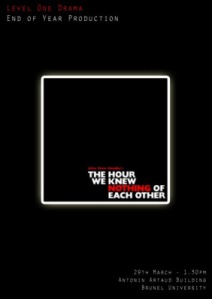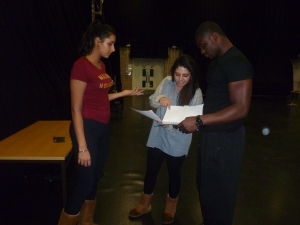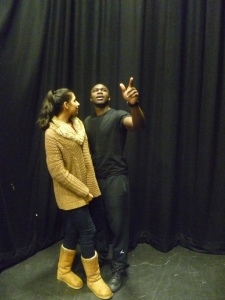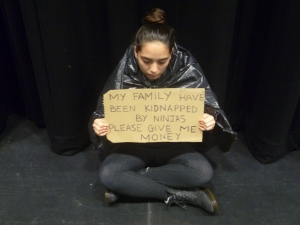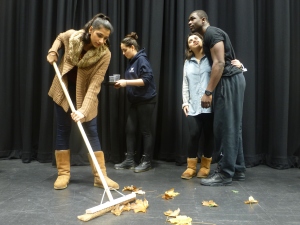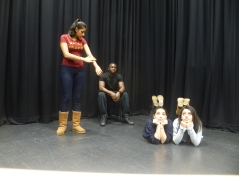29th March 2011 “All the world’s a stage.” – William Shakespeare
The Hour We Knew Nothing of Each Other is a play written by Peter Handke which does not include spoken words. The play was created by Handke as he sat in a café on a busy town square in Italy. Handke captures the different movements and characteristics of a variety of people, ranging from tourists, adults, children and other onlookers who entered and left the square. His inspiration came from allowing himself the time to watch the busy town square come to life as though it were a performance.
Our company was directed by Andrei Bizioreck and our aim as an ensemble was to bring to life those individuals who Handke had described so creatively and to also portray the chaotic yet ever shifting atmosphere of the square.
This play was interesting to work on as a production, as it allowed our class of young actors to adapt to different roles as well as to work collaboratively to heighten the aura of each scene. During parts of the rehearsal period, Andre would give us firm instructions as a director to how he wanted scenes and emotions to be performed. However, as a director he also encouraged group work, which stimulated us to think about our own perception of the characters presented in the play. I found that during the rehearsal period, everyone had different ideas about how to perform each character. Andre therefore introduced us to an idea where we used one word to summarise an emotion or precise motive felt by a particular character. We worked in groups and annotated our scripts which I found particularly helpful as characters would usually cross paths within the play. By working in groups to annotate the script, it was easier to discuss how we would create this connection or distance between individuals.
The play did not include any spoken words therefore; we focussed heavily on the physicality of our performance and the motives behind each characters movement. For example, during one scene, I was chosen to characterise the movements of a young women who was besotted with her male lover. We chose to stay in close proximity with each other and kept a stern sense of eye contact at all times to create this closeness between us on stage.
Although Handke originally wrote the play consisting of just over four hundred characters, our production company consisted of a cast of thirty. This meant that all actors had the opportunity to play a variety of roles and were continuously active throughout the production and rehersal process. The performance also relied heavily on costume and props and it was vital that our company focussed as an ensemble make sure the props were kept organised as well as communicating with each other to keep our timing on stage as accurate as possible.
Director Andrei stressed the important of considering the motive behind each movement and our rehearsal process relied heavily on thinking about the expression “Who, What, Where and how?” I found it helpful to relate back to this expression during the rehearsal period as I played over 10 roles and it was important for me to distinguish different emotions for each character. At the beginning of the performance I played the role of a graceful air-hostess, elegantly shifting across the stage and then changed into a besotted young lover. My other interesting roles included an apprehensive and monotonous street cleaner and an old pension who gradually made her way across the square with great difficulty. The characters I performed as all varied in age and persona and it was important for me to capture these characteristics for the audience to understand their true emotions.
Ultimately the feedback from the audience was extremely positive as they spoke of the comic aspect of the scenes and the scenes where the stage was bursting with energy and movement. This particular performance inspired me in particular as I recognised how important the rehearsal period was in terms of creating a clear performance using a large caste. I felt Andrei’s motivation and his efforts to make us understand our characters personally, helped me to create a realistic and convincing depiction of each character. I hope to develop my skills in dual rolling and physical theatre further and someday direct a similar production as a teacher.
Leave a comment